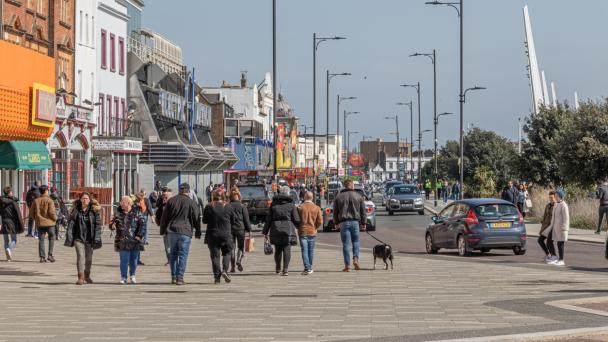Using health data to identify and approach people about health and care research: A Public Dialogue

As part of our ongoing research about public attitudes towards post-Brexit policy, NatCen ran a large scale Deliberative Poll in October 2020, bringing together over 200 members of the British public online. Over one weekend, participants debated the future of immigration, food policy and consumer regulation in small groups chaired by neutral moderators. After discussing each topic, groups also posed questions to a panel of subject-matter experts representing different points of view.
In a post published earlier this week, NatCen researchers Maria David and Josh Vey reflected on the process of preparing for this unique large-scale event. In today’s post, Maria and Josh discuss the experience of taking part in the event itself, from the perspective of both moderators and participants.
In virtually bringing together participants who haven’t met before, one key challenge is establishing the right conditions for dialogue. The internet can offer opportunities to express views more baldly and often with greater anonymity than in person, and the last thing we wanted was for the event to turn into a war of words. Good deliberation should neither facilitate debate, nor agreement for the sake of agreement. The end goal should be to encourage open discussion and to create opportunities for participants to learn from others.
In the case of Deliberative Polling, it is also not necessary for participants to reach a consensus, and they are invited to express their views on the matters discussed in a confidential post-event questionnaire.
Immigration policy, the first of our topics chosen for discussion, is highly disputed and, while less controversial, the other two topics on the agenda were by no means straightforward either. There was no single answer to any of the topics discussed, but a range of pathways the UK could take, each with associated costs and benefits that will differentially affect the British public – including participants themselves. Therefore, there was much potential for disagreement. However, owing to our skilful facilitators, each of the sessions panned out remarkably well. Participants commented on how positive and respectful the dynamic was.
Following each discussion, participants identified questions they wanted to ask a panel of experts. These questions were intended to help them clarify points that had arisen in their small groups to help them better understand an option further. The panels gave participants the chance to hear more about contrasting sides of the debate from knowledgeable perspectives – including arguments they would not otherwise have engaged with – before reaching their own considered conclusions, or reaffirming them.
Overall, participants reported positive experiences of the expert plenary sessions. 93% reported that they were valuable in helping them clarify their position. Feedback mentioned them as being respectful, well balanced and informative. One attendee even felt they had been provided with a level of information that is lacking from public dialogue more widely.
But how did moderators find the event? For those of us also involved in organising, it was a welcome change of pace. We could stop thinking about the project as a whole (and every little thing that could go wrong) and instead give our full attention to the small group of participants allocated to us. On Saturday morning, we were curious to see how our participants would look and act, to hear their views and discussions. The sheer excitement of the event finally taking place was enough to calm any feelings of nervousness – even for those who had never facilitated deliberative workshops before!
Moderating for the Future of Britain event proved to be a unique experience in more ways than we initially expected. Maybe for the first time, we had the chance to get a more rounded view of our participants, to see them in different contexts and engaging with different topics.
As the event unfolded, we also started to learn their names, voice, and body language. As moderators, we were going through the same motions of taking tea breaks and listening to expert plenaries – and we did feel as part of the group. In their feedback to the research team, other facilitators also observed that the participants and moderators grew in confidence and worked better as a group over time.
But what about keeping up a sense of team spirit among colleagues when everyone was working from home? Is it even possible to feel part of a team when you are not in an office together and you cannot celebrate completing the event at the pub? As our reaction to the pandemic keeps on demonstrating, it is. Even though each moderator created their own Zoom meeting for their small group to attend, we did not feel isolated from our colleagues.
We did feel part of something bigger than the small group discussion we were moderating when hearing questions from countless other groups being put to experts during the plenary sessions, and when we came together to de-brief and share impressions at the end of each day. Through the event, NatCen researchers were also commenting in a group chat whenever they had a free second. This was a constant reminder that we were in the same boat with dozens of our colleagues.

Moderators and organisers sharing last impressions and saying goodbye at the end of the weekend
Having concluded our final Deliberative Poll for the Future of Britain project, we have learned a great deal about overcoming the challenges of online deliberation. Due to the Covid-19 pandemic, we were not able compare the effectiveness of in person and online deliberative events. However, we are confident that online Deliberative Polling can serve as a valuable tool for uncovering public opinion and understanding the impact of deliberation.
The first findings from the Future of Britain project were published on January 1st 2021. We are now preparing a series of resources that collect together our learning on how to design and deliver online Deliberative Polls.




Receive a regular update, sent directly to your inbox, with a summary of our current events, research, blogs and comment.
Subscribe